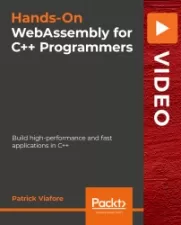C++ Concurrency in Action Second Edition
Focused View
13:04:52
69 View
01 - What is concurrency.mp4
09:41
02 - Approaches to concurrency.mp4
07:41
03 - Why use concurrency.mp4
11:26
04 - Concurrency and multithreading in C++.mp4
07:04
05 - Efficiency in the C++ Thread Library.mp4
05:02
06 - Getting started.mp4
04:57
07 - Basic thread management.mp4
08:49
08 - Waiting for a thread to complete.mp4
09:29
09 - Passing arguments to a thread function.mp4
06:26
10 - Transferring ownership of a thread.mp4
06:28
11 - Choosing the number of threads at runtime.mp4
05:51
12 - Identifying threads.mp4
05:20
13 - Problems with sharing data between threads.mp4
10:46
14 - Protecting shared data with mutexes.mp4
08:37
15 - Spotting race conditions inherent in interfaces Part 1.mp4
08:10
16 - Spotting race conditions inherent in interfaces Part 2.mp4
08:03
17 - Deadlock - the problem and a solution.mp4
06:30
18 - Further guidelines for avoiding deadlock Part 1.mp4
05:50
19 - Further guidelines for avoiding deadlock Part 2.mp4
08:33
20 - Flexible locking with std - -unique lock.mp4
06:55
21 - Locking at an appropriate granularity.mp4
05:57
22 - Alternative facilities for protecting shared data.mp4
07:38
23 - Protecting rarely updated data structures.mp4
09:15
24 - Waiting for an event or other condition.mp4
11:18
25 - Building a thread-safe queue with condition variables.mp4
05:31
26 - Waiting for one-off events with futures.mp4
07:53
27 - Associating a task with a future.mp4
10:23
28 - Saving an exception for the future.mp4
08:35
29 - Waiting with a time limit.mp4
10:25
30 - Time points.mp4
07:00
31 - Using synchronization of operations to simplify code.mp4
11:17
32 - Synchronizing operations with message passing.mp4
08:42
33 - Continuation-style concurrency with the Concurrency TS.mp4
04:38
34 - Chaining continuations.mp4
08:40
35 - Waiting for the first future in a set with when any.mp4
07:56
36 - std - -experimental - -barrier - a basic barrier.mp4
08:22
37 - Memory model basics.mp4
10:41
38 - Atomic operations and types in C++.mp4
12:01
39 - Operations on std - -atomic flag.mp4
04:23
40 - Operations on std - -atomic bool.mp4
11:24
41 - Operations on standard atomic integral types.mp4
07:59
42 - Free functions for atomic operations.mp4
06:22
43 - Synchronizing operations and enforcing ordering.mp4
09:51
44 - Memory ordering for atomic operations Part 1.mp4
08:27
45 - Memory ordering for atomic operations Part 2.mp4
06:56
46 - Memory ordering for atomic operations Part 3.mp4
12:32
47 - Memory ordering for atomic operations Part 4.mp4
11:30
48 - Release sequences and synchronizes-with.mp4
09:51
49 - Ordering non-atomic operations.mp4
12:26
50 - What does it mean to design for concurrency.mp4
08:19
51 - Lock-based concurrent data structures.mp4
07:54
52 - A thread-safe queue using locks and condition variables.mp4
04:50
53 - A thread-safe queue using fine-grained locks and condition variables Part 1.mp4
03:23
54 - A thread-safe queue using fine-grained locks and condition variables Part 2.mp4
11:07
55 - A thread-safe queue using fine-grained locks and condition variables Part 3.mp4
05:48
56 - Designing more complex lock-based data structures.mp4
11:06
57 - Writing a thread-safe list using locks.mp4
09:14
58 - Definitions and consequences.mp4
06:44
59 - Wait-free data structures.mp4
05:40
60 - Examples of lock-free data structures.mp4
10:18
61 - Stopping those pesky leaks - managing memory in lock-free data structures.mp4
07:37
62 - Detecting nodes that cant be reclaimed using hazard pointers Part 1.mp4
11:54
63 - Detecting nodes that cant be reclaimed using hazard pointers Part 2.mp4
05:01
64 - Detecting nodes in use with reference counting.mp4
10:00
65 - Applying the memory model to the lock-free stack.mp4
07:21
66 - Writing a thread-safe queue without locks Part 1.mp4
03:27
67 - Writing a thread-safe queue without locks Part 2.mp4
09:40
68 - Writing a thread-safe queue without locks Part 3.mp4
05:06
69 - Guidelines for writing lock-free data structures.mp4
08:36
70 - Techniques for dividing work between threads.mp4
08:08
71 - Dividing data recursively.mp4
06:48
72 - Dividing work by task type.mp4
09:02
73 - Factors affecting the performance of concurrent code.mp4
11:09
74 - False sharing.mp4
07:45
75 - Designing data structures for multithreaded performance.mp4
11:19
76 - Additional considerations when designing for concurrency.mp4
11:28
77 - Scalability and Amdahls law.mp4
10:22
78 - Designing concurrent code in practice.mp4
04:48
79 - A parallel implementation of std - -find.mp4
10:49
80 - A parallel implementation of std - -partial sum Part 1.mp4
09:05
81 - A parallel implementation of std - -partial sum Part 2.mp4
10:16
82 - Thread pools.mp4
07:21
83 - Waiting for tasks submitted to a thread pool.mp4
05:26
84 - Tasks that wait for other tasks.mp4
07:39
85 - Work stealing.mp4
04:20
86 - Interrupting threads.mp4
05:22
87 - Interrupting a condition variable wait.mp4
08:32
88 - Handling interruptions.mp4
05:04
89 - Parallelizing the standard library algorithms.mp4
08:38
90 - std - -execution - -parallel policy.mp4
04:00
91 - The parallel algorithms from the C++ Standard Library.mp4
06:44
92 - Examples of using parallel algorithms.mp4
05:38
93 - Types of concurrency-related bugs.mp4
08:19
94 - Techniques for locating concurrency-related bugs.mp4
07:14
95 - Locating concurrency-related bugs by testing.mp4
09:54
96 - Multithreaded testing techniques.mp4
07:45
97 - Structuring multithreaded test code.mp4
09:21
More details
User Reviews
Rating
average 0
Focused display
Category

O'Reilly
View courses O'ReillyO'Reilly Media is an American learning company established by Tim O'Reilly that publishes books, produces tech conferences, and provides an online learning platform. Its distinctive brand features a woodcut of an animal on many of its book covers.
- language english
- Training sessions 97
- duration 13:04:52
- Release Date 2023/11/06










